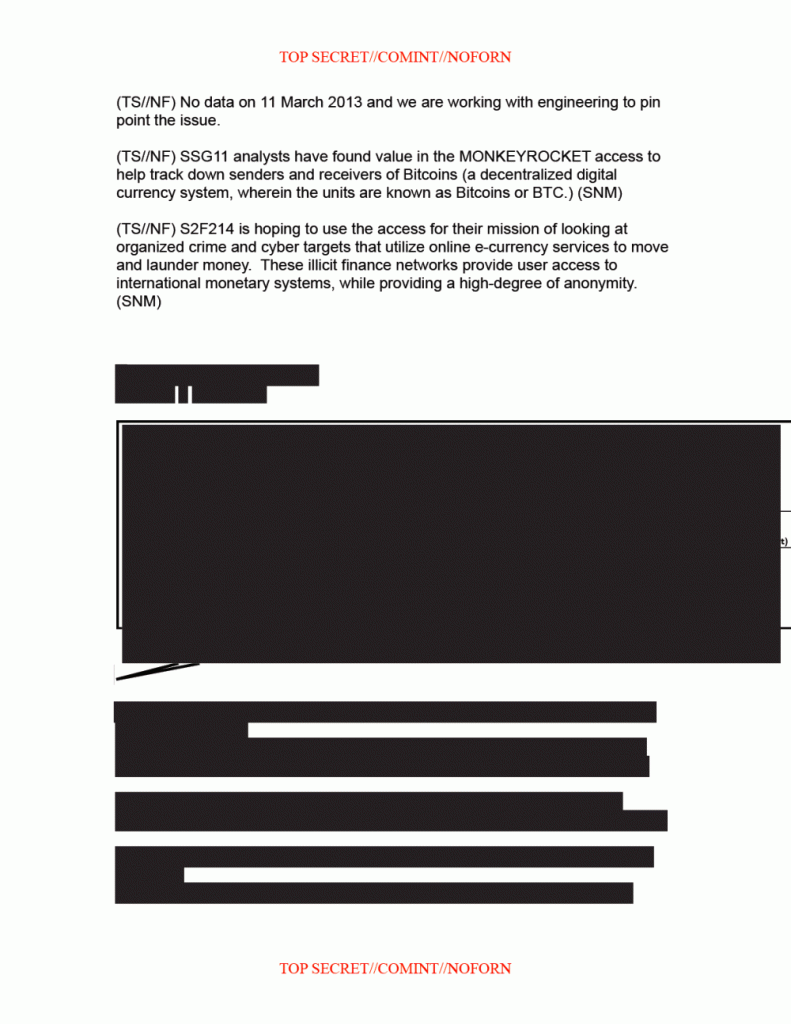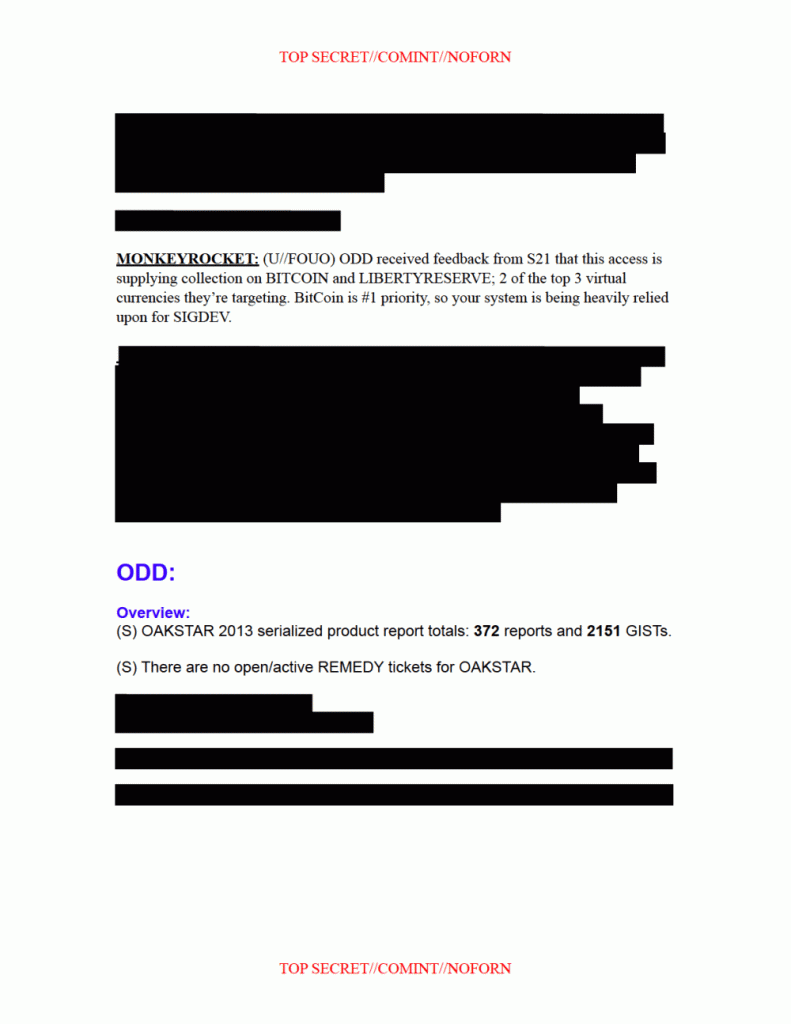
Xkeyscore. MAC addresses. OAKSTAR. MONKEYROCKET. Edward Snowden is at it again. This time the world’s most notorious whistleblower has handed over National Security Agency (NSA) documentation to online investigative news outlet The Intercept revealing an invasive covert program to track bitcoin users using spy tools he uncovered during his infamous first go-round. The implications include the future of privacy along with warrantless data collection being used to prosecute bitcoiners such as Ross Ulbricht of Silk Road.
Also read: Bitcoiners Demand More Crypto CFDs and Spread-Betting in the UK
Snowden Reveals How NSA Tracked Bitcoin Users
Ever get the feeling you’re being watched? Department of Homeland Security (DHS) Acting Assistant Secretary for Legislative Affairs Brian de Vallance, in a November 2013 letter to Congress, worried that “with the advent of virtual currencies and the ease with which financial transactions can be exploited by criminal organizations, DHS has recognized the need for an aggressive posture toward this evolving trend.” Infamous whistleblower Edward Snowden seems to have found a trove of heavily redacted, classified NSA documents attesting to that “aggressive posture.”
It’s fitting Mr. Snowden should share them with The Intercept, an online investigative news organization founded by his benefactor, attorney turned journalist Glenn Greenwald. Mr. Greenwald was then writing for The Guardian, and the two unleashed the largest batch of government security documents ever revealed about US and UK global surveillance.

Interestingly, the documents tracking bitcoin users stem from roughly the same period, 2013. They detail bitcoiners all over the world were targeted as powers granted the NSA under the rubric of fighting terrorism expanded, and might have even begun to play a role in early crypto prosecutions such as Ross Ulbricht and Silk Road.
American Civil Liberties Union’s Patrick Toomey, of its National Security Project, explained, “If the government’s criminal investigations secretly relied on NSA spying, that would be a serious concern. Individuals facing criminal prosecution have a right to know how the government came by its evidence, so that they can challenge whether the government’s methods were lawful. That is a basic principle of due process. The government should not be hiding the true sources for its evidence in court by inventing a different trail.”
Raw, Global Internet Traffic
Readers in recent years have been thrown a pivot. It’s not the currency aspect of bitcoin that is to be admired, but rather blockchain technology or some other such related innovation. Yet all along, since its inception, bitcoin was meant to be digital cash, a direct way to undermine governments and their cartelized banking system. In popular press accounts this aspect has been downplayed and almost forgotten. Until now.
It appears NSA has been focused on what’s important or novel about bitcoin, and it ain’t blockchain. And since the initial Mr. Snowden revelations of the Agency’s widespread data gathering streams and programs, enthusiasts have long suspected something of the sort was happening in crypto. Document sentences filled with snippets such as “help track down senders and receivers of Bitcoins” will only fuel more speculation.
 “The data source appears to have leveraged NSA’s ability to harvest and analyze raw, global internet traffic while also exploiting an unnamed software program that purported to offer anonymity to users, according to other documents,” Sam Biddle of The Intercept wrote, noting “Bitcoin is #1 priority” over other cryptocurrencies, according to documents.
“The data source appears to have leveraged NSA’s ability to harvest and analyze raw, global internet traffic while also exploiting an unnamed software program that purported to offer anonymity to users, according to other documents,” Sam Biddle of The Intercept wrote, noting “Bitcoin is #1 priority” over other cryptocurrencies, according to documents.
Information gathered wasn’t just about transactions. In fact, “the tracking may also have involved gathering intimate details of these users’ computers. The NSA collected some Bitcoin users’ password information, internet activity, and a type of unique device identification number known as a MAC address,” Mr. Biddle explains. A MAC address is also known as a media access control address, a unique hardware identifier. A crisper analogy would be to liken a MAC to an American social security number which remains with a person (device) for their entire lives.
Unsuspecting Bitcoiners
Deeper still, the NSA documents confirm the ease at which the Agency could identify users in particular, “hinting that NSA may have been using its Xkeyscore searching system, where the Bitcoin information and wide range of other NSA data was cataloged, to enhance its information on Bitcoin users. An NSA reference document indicated that the data source provided ‘user data such as billing information and Internet Protocol addresses.’ With this sort of information in hand, putting a name to a given Bitcoin user would be easy,” the report detailed. Xkeyscore (XKS) came into popular consciousness through Mr. Snowden’s first revelations. XKS was used by the NSA globally, collecting internet data daily, and shared with most English-speaking, industrialized nations. Its source code was publically analyzed in Germany during Summer of 2014.
The report relies heavily on tracking derived from OAKSTAR, also first uncovered by Mr. Snowden during his initial affair, which uses “a collection of covert corporate partnerships enabling the agency to monitor communications, including by harvesting internet data as it traveled along fiber optic cables that undergird the internet.” A sister program, MONKEYROCKET, was employed to snatch data from Asia, Europe, the Middle East, and South America, according to documents. It’s “full take”, which can mean “the entirety of data passing through a network was examined and at least some entire data sessions were stored for later analysis,” The Intercept claims.
 As part of a broader anti-terrorism program, MONKEYROCKET was also used to develop software promising relative anonymity to unsuspecting bitcoiners in places like China and Iran. The program wasn’t disclosed, but its import is plain enough: “it functioned as a privacy bait and switch, tricking Bitcoin users into using a tool they thought would provide anonymity online but was actually funneling data directly to the NSA.” This seems to indicate a virtual private network (VPN) of some kind was compromised. The forever rub with VPNs is that users have to trust the issuer.
As part of a broader anti-terrorism program, MONKEYROCKET was also used to develop software promising relative anonymity to unsuspecting bitcoiners in places like China and Iran. The program wasn’t disclosed, but its import is plain enough: “it functioned as a privacy bait and switch, tricking Bitcoin users into using a tool they thought would provide anonymity online but was actually funneling data directly to the NSA.” This seems to indicate a virtual private network (VPN) of some kind was compromised. The forever rub with VPNs is that users have to trust the issuer.
While the latest news might further push enthusiasts toward privacy coins, equally disturbing, if not more, is the assumption the NSA played a role in the prosecution of Ross Ulbricht, now serving double life without the possibility of parole and awaiting a possible Supreme Court reprieve. Mr. Ulbricht argued the Federal Bureau of Investigation’s recounting of their case left serious holes. And if it could be proved an outside entity, like the NSA, used unethical, illegal means to obtain evidence, then the entire prosecution against him was compromised. Mr. Snowden’s current batch doesn’t speak to the issue directly; however, the timeframe and government sense of urgency seems to make it at least plausible, if not probable.
Do you think Snowden’s latest documents will push more enthusiasts to privacy coins? Will the information provided help Ross Ulbricht? Let us know in the comments!
Images via Pixabay, The Intercept.
At news.Bitcoin.com we do not censor any comment content based on politics or personal opinions. So, please be patient. Your comment will be published.
The post Snowden Releases NSA Documents Showing Bitcoin Was “#1 Priority” appeared first on Bitcoin News.
from Bitcoin News http://ift.tt/2u8OJG0 Snowden Releases NSA Documents Showing Bitcoin Was “#1 Priority”
